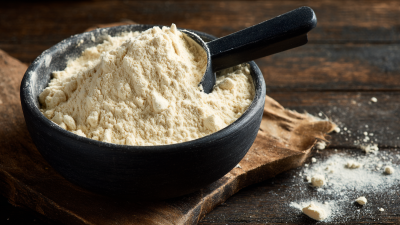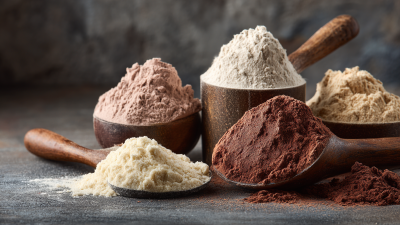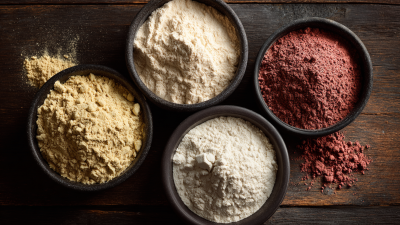The emergence of Isolate Protein Powder in the nutritional landscape marks a significant shift in dietary supplements, offering unparalleled benefits backed by scientific research. According to a report from the Global Market Insights, the protein powder market is projected to exceed $33 billion by 2027, with Isolate Protein Powder accounting for a substantial share due to its high protein content and minimal carbohydrates and fats. This trend is further supported by a study published in the American Journal of Clinical Nutrition, which indicates that whey protein isolates can enhance muscle recovery and promote weight management. As consumers increasingly seek effective nutritional solutions for fitness and wellness, Isolate Protein Powder is poised to revolutionize meal planning and dietary choices, helping individuals achieve their health goals more efficiently than ever before.

The rise of plant-based isolate protein powders marks a significant shift in the world of nutrition, driven by both health-conscious consumers and environmental awareness. As more individuals seek to adopt sustainable diets, the demand for high-quality plant proteins has surged. These powders, sourced from legumes, seeds, and grains, provide an excellent alternative to traditional animal-based proteins, offering comparable amino acid profiles while being easier on the planet. With their minimal processing, plant-based isolates retain essential nutrients, making them an ideal choice for fitness enthusiasts and casual consumers alike.
Moreover, scientific research continues to support the health benefits of plant-based protein powders. Rich in fiber, vitamins, and minerals, they contribute to improved digestion and overall wellness. Additionally, they cater to various dietary needs, including vegan and gluten-free options. As innovations in food technology enhance the taste and solubility of these products, consumers can enjoy a protein supplementation that is not only nutritious but also delicious. This evolution signifies a broader movement towards plant-based living, fostering a healthier lifestyle and a more sustainable future for our planet.
As the demand for quality nutrition continues to rise, the protein supplement industry is witnessing a significant transformation, driven by innovative ingredients and new sources of isolate proteins. Traditionally dominated by whey and casein, the market is now embracing plant-based alternatives like pea, rice, and hemp proteins, catering to the growing vegetarian and vegan populations. These novel sources not only provide essential amino acids but also introduce a spectrum of nutrients, including vitamins, minerals, and antioxidants, enriching the overall dietary profile of protein powders.
Moreover, advancements in food technology are enabling the extraction and purification of protein from various unconventional sources. Insects, for instance, are gaining traction due to their high protein content and lower environmental impact compared to livestock. Algal proteins, derived from nutrient-rich algae, are also emerging, offering a sustainable and efficient protein source packed with omega-3 fatty acids. These breakthrough ingredients are truly revolutionizing the approach to nutrition, making protein powders more versatile and accessible while addressing dietary preferences and sustainability concerns.
This chart illustrates the popularity of various sources of isolate protein powder, showcasing the leading sources in the market. Whey protein remains the most popular due to its high bioavailability and effectiveness, followed by soy and plant-based options like pea, rice, and hemp proteins that are gaining traction in the nutrition community.
Isolate protein powder has emerged as a staple in the nutrition world, notably due to its impressive health benefits and high nutritional value. This refined form of protein is crafted through advanced filtering processes that remove most fats and carbohydrates, resulting in a product that is over 90% protein. This concentration not only makes isolate protein an ideal choice for muscle recovery and growth but also supports weight management by curbing appetite and promoting satiety. The science backing these benefits shows that individuals who incorporate isolate protein powder into their diets can experience improved muscle synthesis, enhanced metabolic function, and overall better body composition.
Beyond muscle health, isolate protein provides essential amino acids that play a critical role in various bodily functions. These amino acids are particularly beneficial for repairing tissues and supporting immune health. Moreover, scientific studies indicate that isolate protein can improve overall nutrient absorption and may even boost the body's antioxidant levels. With low lactose levels, it's also suitable for those with lactose intolerance, making it a versatile option for various dietary needs. As research continues to unfold, the future of isolate protein powder appears promising, revolutionizing the way we approach nutrition and wellness through scientifically-backed benefits.
| Nutritional Component | Amount per Serving (30g) | Health Benefits |
|---|---|---|
| Protein | 25g | Supports muscle growth and repair. |
| Carbohydrates | 1g | Minimal impact on blood sugar levels. |
| Fats | 0.5g | Low fat content for a lean protein source. |
| Calcium | 120mg | Contributes to bone health. |
| Iron | 0.8mg | Supports oxygen transport in the body. |
The landscape of protein supplementation is evolving as consumers become increasingly aware of their nutritional needs. When comparing isolate proteins, whey, soy, and newer alternatives like pea protein emerge as key players, each with distinct benefits. whey protein, derived from dairy, is renowned for its fast absorption rate, making it ideal for post-workout recovery and muscle growth. On the other hand, soy protein offers a plant-based option packed with essential amino acids, catering to vegetarians and those looking to reduce animal product intake.
As health consciousness rises, consumers are also exploring beyond traditional sources. Pea protein has gained traction for its digestibility and minimal allergenic potential, appealing to those with lactose intolerance or soy allergies. This shifts the narrative surrounding isolate proteins from a mere supplement to a strategic nutritional choice, aligning with the diverse dietary preferences in today’s market.
The competition among these protein sources illustrates a broader trend toward personalized nutrition, where individuals can tailor their intake based on lifestyle, health goals, and ethical considerations.
As consumer awareness of health and nutrition continues to rise, isolate protein powders are emerging as a dominant trend in the fitness industry. These high-quality formulations offer a plethora of benefits, appealing to fitness enthusiasts and casual gym-goers alike. With their superior amino acid profiles and lower lactose content, isolate protein powders provide users with an efficient way to support muscle recovery, enhance performance, and meet their daily protein needs without unnecessary carbohydrates and fats.
The popularity of isolate protein powders is also closely tied to the growing demand for transparency and quality in nutritional products. Today's consumers are more informed than ever, driving brands to invest in scientific research and rigorous testing of their products. This shift has led to innovations in flavoring and formulation, making protein supplementation not just a necessity for athletes, but also a satisfying addition to everyday diets. As the fitness landscape continues to evolve, isolate protein powders are at the forefront of shaping consumer habits, influencing everything from meal planning to post-workout recovery rituals.






